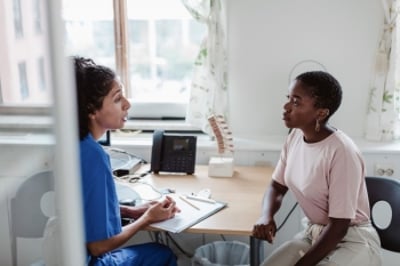Genomic Services Research Program Study for People with Unexpected Genetic Results

Prevention
Study for people who received unexpected genetic test results about their cancer risk after having genetic testing done for some other reason
Clinicaltrials.gov identifier:NCT02595957
Study Contact Information:
For more information, please visit genome.gov/GSRP. If you are interested in joining or want to see if you are eligible, please contact us by email or by phone at: 301-402-6871.
About the Study
A new study is recruiting people who received unexpected genetic test results about their cancer risk after having genetic testing done for some other reason.
The Genomic Services Research Program (GSRP) is a study of people with "secondary results” from genetic testing. Secondary results are unexpected. They are not related to the reason the person had the genetic test but are shared because they may be very important to the person’s health. Most secondary results have to do with high risks for health problems that can be treated or prevented. Many of these results are related to cancer risk. If you think you have received a secondary result, you may be eligible to join this study.
The purpose of this study is to learn about what people think about and do with secondary results. If you or a member of your family have been given a secondary result, please consider partnering with us on this research. Together we hope to understand the health impacts of secondary results on you and your family and discover ways to better support people like you.
For more information, please visit genome.gov/GSRP.
This Study is Open To:
People who:
- Received a genetic testing result related to cancer risks even though they were not having genetic testing to get information about cancer risk. This may include people who have results related to the genes listed below:
- If you have a result in another gene related to cancer risks, please contact us and we can decide if you can join the study.
- Speak English or Spanish
This Study is NOT Open To:
Common things that make someone ineligible for the study are:
- Having received genetic testing to get information about cancer risks
- Having a genetic result related to risk for Alzheimer’s disease and not cancer
- Having a genetic result related to cancer that is labelled on the laboratory report as a
What is Involved for people who join?
We want to know what you do about your result.
- If you join the study, the first phase is a survey and phone interview.
- We will ask you about any changes you made to your healthcare based on the result.
- We will also ask if there were recommendations you did not follow and why.
- Finally, we will ask questions about sharing the result with your family members.
- You may be invited to the second phase of the study.
- This could include extra testing for you and/or your family members at the or in your area. Being in the study and having testing done at the is free. If we ask you to come to the , and you live in the United States, we will pay for your travel and a hotel.
We provide a basic explanation of your result and may offer more. You will get basic information about what your result means. You will also get a checklist of health actions you should take. You may get extra information, counseling or other support to get the healthcare that we recommend.
Help us improve care for future patients. Results like yours are added to genetic testing reports with the hope that they will make families aware of important health risks so they can get the healthcare they need. We know that this does not happen for all families. We intend for our results to help more patients benefit from these results. For example, we hope to learn what makes it hard for patients to get care that they need and how healthcare providers can help.
Please partner with us. Our study would not be possible without patients like you! Only 2 out of 100 people who have genetic testing get an unexpected result, so every patient is valuable to our project.
If you are interested in joining or want to see if you are eligible, please contact us by email at: gsrp@nih.gov, or by phone at: 301-402-6871 or visit this site and fill out the information on this form.
Study Contact Information:
For more information, please visit genome.gov/GSRP. If you are interested in joining or want to see if you are eligible, please contact us by email or by phone at: 301-402-6871.
Locations:
Maryland
City: Bethesda RECRUITING
Facility: National Institutes of Health Clinical Center
Contact Info:
ccopr@nih.gov
800-411-1222
Prevention
Study for people who received unexpected genetic test results about their cancer risk after having genetic testing done for some other reason
Clinicaltrials.gov identifier:NCT02595957
Study Contact Information:
For more information, please visit genome.gov/GSRP. If you are interested in joining or want to see if you are eligible, please contact us by email or by phone at: 301-402-6871.